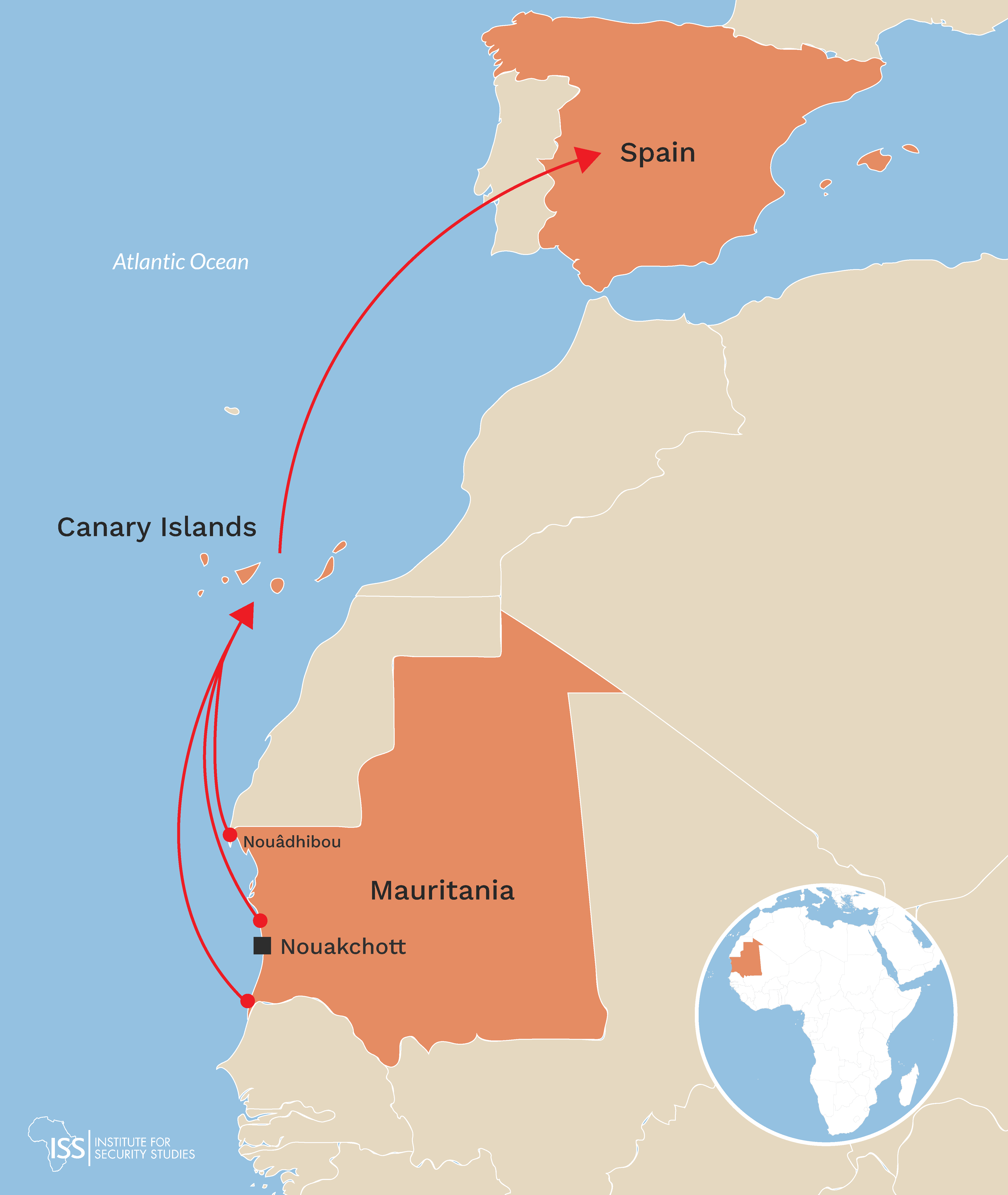ISS TODAY OP-ED
Mauritania becomes latest target in contentious EU migration control strategy agreement

Instead of serving as shields for Europe, African countries should pursue a common approach that puts their citizens first.
On 7 March, the European Union (EU) and Mauritania signed a partnership declaration on irregular migration in Nouakchott. Mauritania is set to receive €210-million to reduce the number of migrants transiting through its territory en route to the Canary Islands. A total of 12,393 migrants disembarked on the Spanish archipelago between 1 January and 15 March this year, compared to 2,178 for the same period in 2023.
Over 80% of the boats that carried them departed from Mauritania or transited through its waters. Some irregular migrants stay in the Canaries or travel to other parts of Spain and Europe.

Mauritania-Canary Islands irregular migration route. (Supplied by ISS Today)
The EU is embarking on this new partnership after disagreements with Tunisia and Niger — two countries on which the EU has partly based its strategy to stem migration flows from Africa. In October last year, Tunisia rejected the €42-million allocated by the EU because it didn’t match the €105-million initially planned.
On 25 November, in retaliation against European sanctions against Niger following that country’s July 2023 coup, the junta repealed the 2015 law governing the Brussels–Niamey agreement. The deal aimed to contain West African migrants on their way to Europe via Libya and Algeria.
The EU’s recent partnership with Mauritania to combat irregular migration is again stirring controversy. Part of the Mauritanian opposition is protesting against the agreement, particularly regarding the reception and accommodation of migrants turned away or expelled from Europe.
Opposition parties’ representatives urged authorities “to terminate this agreement in the best interest of the country”. They said the transfer of migrants back to Mauritania could “pose risks to the security of the country by increasing pressure on limited economic resources, in addition to the spread of cross-border organised crime”.
In response, Mauritania’s government has insisted that the country won’t be a land for receiving or resettling irregular foreign migrants. A 20 February statement by the Interior Ministry said “everything circulating about the naturalisation of illegal foreign migrants to make Mauritania an alternative homeland is baseless”.
After signing similar agreements with Turkey, Morocco, Libya, Niger and Tunisia, the Mauritania deal confirms the EU’s willingness to continue outsourcing migration management. The New Pact on Migration and Asylum, adopted by the European Parliament on 10 April, reinforces the decision to stop irregular migrant arrivals before they reach Europe. Complicated border controls and triage procedures also reduce the number of people eligible for asylum and increase deportations.
Europe has been looking for partners for this outsourcing approach in Africa for almost a decade. But most states reject its offer because migration plays an important role in development by bringing in substantial human and financial capital.
Transit complications
Determined to protect its borders against irregular migrant arrivals, the EU relies on transit countries or states that agree to take in those who are turned back. However, experience from countries that have accepted this role such as Tunisia, Niger, Morocco and Libya shows that it encourages abuses in migration management. Controls and repatriations often lead to political problems and humanitarian incidents.
In Libya, returnees and migrants rounded up during police operations have faced abuse, including extortion, torture, sexual violence and forced labour. Many migrants are stranded or abandoned in the desert in Algeria and Libya, on the other side of the Nigerien border. In Tunisia, President Kais Saied’s violent remarks about migrants in 2023 exposed them to xenophobia.
Read more in Daily Maverick: Tunisia’s xenophobic agenda is hastening liquidity risk for nation’s economy
Migration is a human security and development issue that concerns all African countries. States can sign bilateral agreements against illegal immigration, but effective and humane solutions must be based on regional approaches that support development in the countries concerned.
In 2006 in Banjul, the African Union (AU) defined the Migration Policy Framework for Africa. This became the 2018-30 action plan to guide member states and regional economic communities in managing and governing migration. The AU also has a free movement protocol to facilitate the mobility of Africans on the continent.
Instead of becoming Europe’s border guards or resettlement sites, transit countries should consult with countries of origin and destination, under the AU’s auspices, to find solutions that suit them. Together, they should adopt policies and practices that are in their own interests and those of their citizens.
African countries should avoid devoting resources and European ‘development aid’ to strengthening border control. Instead, they should invest in collective solutions that address the root causes of irregular migration, including improving the governance of investments aimed at creating jobs and reducing poverty and inequality.
Africa must also advocate for Europe to prioritise regular migration pathways instead of focusing on ways to prevent people from entering its space at all costs. Countries of origin and transit should lobby the EU to help implement these solutions, and finance actions that discourage irregular immigration and promote regular migration. The benefits of regular migration have been proven for all the countries concerned.
The Africa-EU Migration, Mobility and Employment Partnership framework also provides sound responses that need to be implemented. Africa must maintain a more balanced approach to managing migration, despite pressure from Europe to deliver on its objectives.
Europe’s adoption of the New Pact on Migration and Asylum is worrying, as it doesn’t promote regular migration routes, but focuses more on security measures against migration. DM
Hassane Koné, Senior Researcher, Institute for Security Studies (ISS) Regional Office for West Africa, Sahel and Lake Chad Basin.
First published by ISS Today.

















Comments - Please login in order to comment.